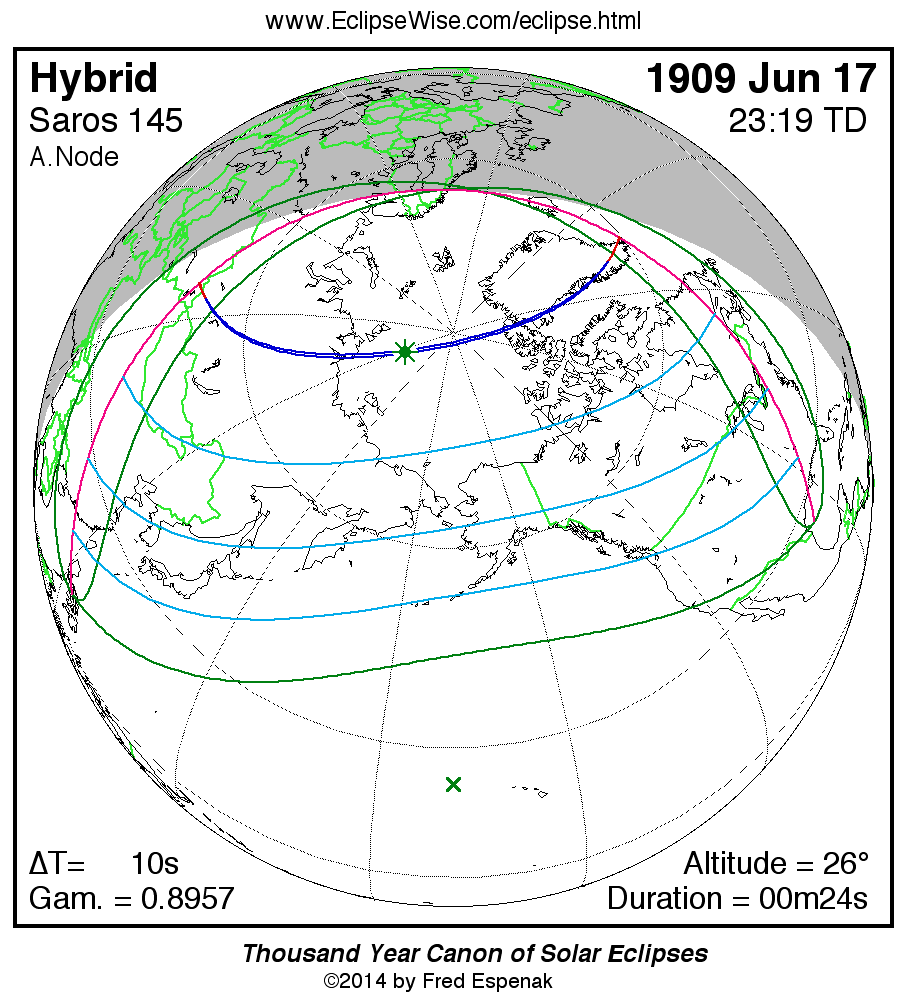Solar Eclipse Circumstances Calculator
Hybrid Solar Eclipse of 1909 Jun 17
Fred Espenak
Introduction
The Solar Eclipse Circumstances Calculator computes the eclipse circumstances for all major cities in a geographic region for the Hybrid Solar Eclipse of 1909 Jun 17 .
Simply follow these instructions:
- Section 1 - Select a Output Time (either Local Standard Time, Daylight Saving Time, or Universal Time (UT1)).
- Section 2 - Select Geographic Region coordinates.
- Section 3 - A table will be generated giving the eclipse circumstances for all cities in the selected geogrphic region.
The generated eclipse circumstances table lists important information about the eclipse for each city:
- The type of eclipse seen from each city (P=Partial, A=Annular, T=Total)
- The times when the partial eclipse begins and ends.
- The times when the total (or annular) eclipse begins and ends.
- The time of maximum eclipse.
- The altitude on the Sun above the horizon (degrees) at each of these times.
- The Eclipse Magnitude at maximum eclipse.
- The Eclipse Obscuration at maximum eclipse.
- The Eclipse Duration of either the total or annular phase (if any).
Note than country names for cities appear as the ISO 3-Letter Country Code Abbreviations (Wikipedia).
For more information about the eclipse circumstances table, see the Key to Solar Eclipse Circumstances Calculator page.
Section 1: Select Output Time
Select the Output Time in which you wish the eclipse circumstances to be displayed.
Choose either Local Standard Time,
Daylight Saving Time (DST), or
Universal Time (UT1):
| Local Standard Time | Daylight Saving Time (DST) | Universal Time (UT1) |
Note: Do NOT choose Local Daylight Saving Time (DST) unless DST is in effect during the eclipse in at least some portion of the geographic region selected in Section 2. Cities that never use DST will be unaffected in either case. See Daylight Saving Time by Country (Wikipedia) for more information.
Section 2: Select Geographic Coordinates
Choose either option A (file of citiy coordinates in a geographic region) or B (manually enter city coordinates):
A: Select Geographic Region
Choose a Geographic Region (of city coordinates) to generate eclipse circumstances table (click on button):
B: Manually Add One or More Locations
| Location name | |
| d m s | Latitude ( South) |
| d m s | Longitude ( East) |
| Elevation (meters) | |
| Select the default local time zone | |
| Enable daylight saving time offset for this location? | |
Additions to lists of cities will appear first in the Section 3 report as soon as you add the location. If the location does not appear displayed list, there is no eclipse there. Check your input carefully before adding new additions. You can always remove the last entry made and start again if you make a mistake.

